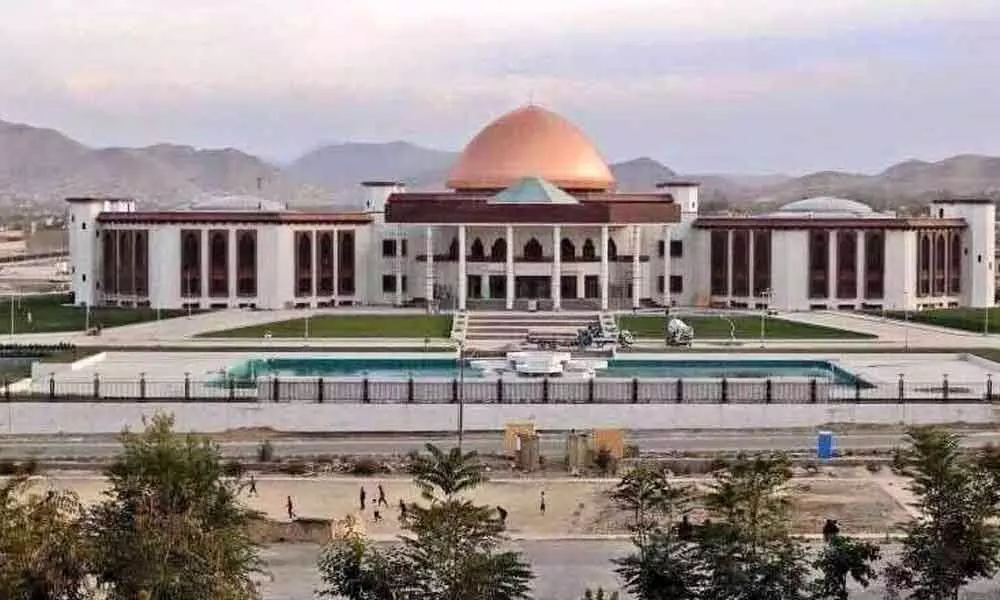Live
- Nortje ruled out of SA’s remaining white-ball matches against Pakistan
- Mamata doesn't want INDIA bloc to succeed, claims BJP's Rahul Sinha
- Air India Express cancels flights at Chennai airport due to deluge
- Kejriwal promises Rs 2,100 for Delhi women if AAP wins polls, BJP takes ‘lollipop’ jibe
- JPC Chairman supports Assam govt's 'No NRC, No Aadhaar,' rule
- Stoinis vows to revive Melbourne Stars’ glory with fresh leadership
- DDA easing freehold conversion of shops: MoS Sahu
- CP Sudheer Babu Updates on Manchu Family Cases
- Keerthy Suresh Marries Long-time Friend Antony Thattil in Goa
- Siddaramaiah govt defends police action on Panchamasali Lingayat protesters
Just In
Kabul happenings pain Afghan Parliament builder from Hyderabad


Afghan Parliament
Besides Parliament, Seenaiah & Co instrumental in huge infra development
As world watched incidents from Afghanistan capital Kabul of Taliban commanders taking up sofas and offices in the Afghan Parliament, a few people in Hyderabad were wondering if the palatial building they took five years to build would even retain its glory. Built at a cost of $90 million and funded by the Indian government, among the few wholly Indian construction initiatives in that country post US-Nato invasion, the Parliament was a gift from the people of India, inaugurated in 2015 by Prime Minister Narendra Modi.
At B Seenaiah & Company (projects) Ltd, the Hyderabad-based company that was contracted to build the Parliament, there was amazement that the US would leave that country in such a pitiable state.
Seenaiah, MD, recalls the days when nearly 300 construction workers from AP and Telangana were involved in several projects across Afghanistan. BSCPL along with C & C (based in Punjab) built 600-km of the Kabul-Kandahar-Herat highway, that now forms a vital artery that connects three corners of Afghanistan, perhaps the first such massive road built in that country's history.
He said the road projects from Kabul to Herat via Kandahar was earlier taken up by a Chinese company. "When they abandoned it, we took over," he said. The entire machinery had to be brought from outside that country. Every day, the machinery used to be moved 50 km from the camp to work site and back for security reasons. The extra costs due to this were reimbursed by the US government. While the hot mixer and crushers were located inside the camp, the other machinery had to be moved morning to the site, like the road rollers, pavers, and water tankers.
"There were no problems on the food aspect. Much of commodities were imported from outside and we had menus as per workers food tastes. But the weather was really challenging.
It was hot during day and at times, it plummeted to 4 degrees. Sometimes, while traveling, Taliban used to attack. We lost machinery worth nearly Rs 40 crore that was set on fire," he said. "No insurance companies were willing to insure. We then took this up with the US contracting agency and they gave us in writing that they will reimburse it. The camp site was shifted every 60 km, and site was selected where good rock material was available so that we could use and deploy our crushers at the camp site itself," he added. "It took five years to build the Parliament. All the material was shipped from abroad and then by road container transport reach us via either Pakistani ports or via Chabahar port of Iran," said Seenaiah. "The locals were friendly and nice. It was Taliban which tried to flex its muscle. Two of our workers had gone out on an errand, were stopped and kidnapped. It took us 21 days of constant engagement with the entire government machinery to get them released. Ever since the US government announced its withdrawal, I was expecting this to happen," he said.

© 2024 Hyderabad Media House Limited/The Hans India. All rights reserved. Powered by hocalwire.com






